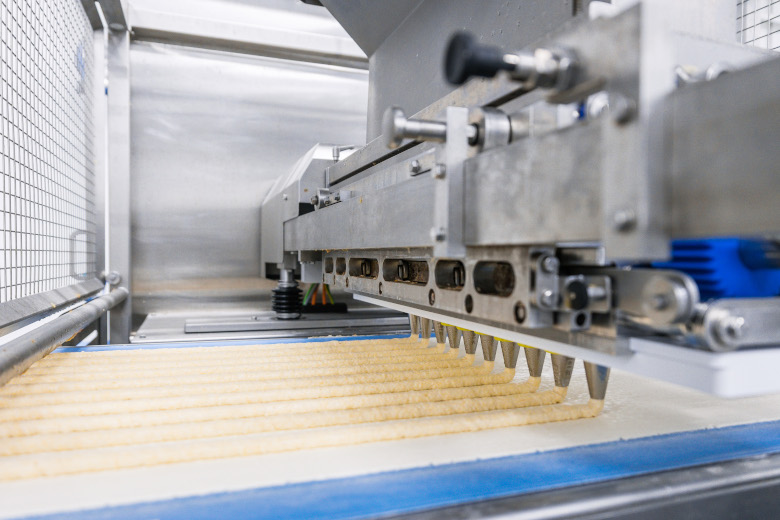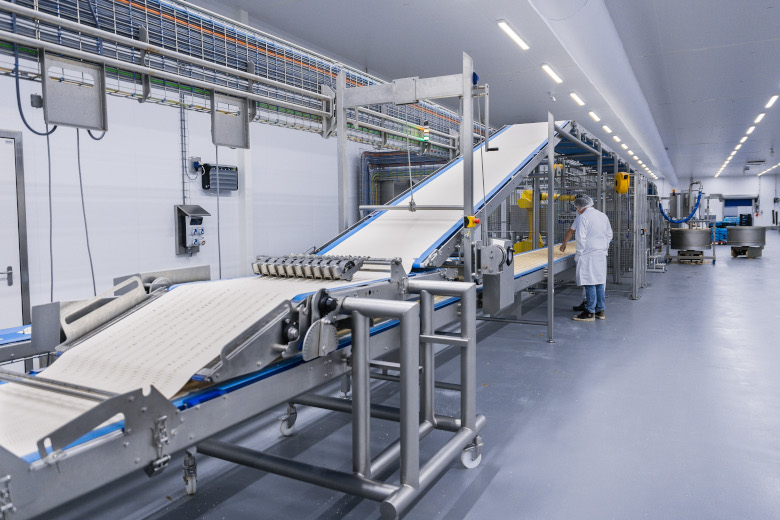
Royal Smilde is known for its rich diversity of sweet and savory baked creations. Either sold under its own labels, through collaborations, or as private labels, the products made by the Dutch bakery are in growing demand worldwide. A very flexible production line helped them increase production volumes, built by AMF Bakery Systems (Tromp). Particular care was given to automating apple turnover production, namely – dough folding into a triangle.
From its production facilities in Edam, Bolsward and Roden, Royal Smilde Bakery supplies bakeries, retailers, food service and end consumers in the Netherlands and its reach goes well beyond its home market, extending from European countries to the US, the Middle East, South Africa and even goes as far as China. Its portfolio includes unique offerings for each industry segment – for example, its popular apple turnovers are sold to retailers, sausage rolls in food service, and ready-to-bake mixes are sold in supermarkets for at-home preparation.
Smilde is a growing business with an expanding distribution range. It is an experienced baker of traditional snacks who also embraces new trends: meat snacks are an important specialty, but, Smilde has also included vegetarian and vegan creations in its offerings. Better-for-you specialties are also an important segment in the company’s recent R&D focus, to meet the consumers’ evolving interests: clean-label products, smaller portion sizes, low-sugar and low-salt alternatives. The Nutriscore has not officially arrived in the Netherlands yet, but the company is preparing for it: “We are looking into reformulating our snacks to fit into a better Nutriscore category and also at developing new snacks with a Nutriscore of A and B,” shares Nynke Hopmans, NPD & QA Manager, Royal Smilde.
At its Edam plant, Smilde Bakery makes flaky pastries and meringue, as well as various sweet and savory snacks alongside puff pastry tarts, meringue and creamhorns. In Bolsward, shortbread with various filling options is produced.
Pastry snacks are an important segment of the product ranges it produces. Consumers in the UK enjoy Smilde’s creamhorns, while in the Netherlands, apple turnovers are the most popular offering in this category, followed by sausage rolls, frikandelbroodjes, kaasbroodje (cheese rolls) and another popular Dutch specialty – gevulde koeken (cookies with almond paste, crumbly on the outside and soft on the inside).
Wanted: a new and improved pastry line
As the company celebrated 160 years in the baking business in 2023, it has done so with an auspicious investment: a new production line – its biggest running line, tailored to its needs, now automates processes for the manufacture of sweet and savory snacks and pastries. It currently produces mostly apple turnovers. AMF Bakery Systems (Tromp) designed the turnkey pastry line, according to the manufacturing needs in Edam, for the large volume make-up of sweet and savory products. The main products produced on this line are sausage rolls, apple turnovers and cheese rolls. It can also be used for other products, including frikandel rolls, cherry lattice and apricot snacks. In this way, the main product manufactured on the line can easily be switched at any time, to suit changing or new contracts, explains Jeroen Van Dijk, Manager Operations, Royal Smilde Bakery.
In the concept stage of this project for a pastry line, Smilde checked alternatives from several suppliers. Out of them, AMF was the provider who offered the opportunity to build the custom solution for apple turnover folding, as its specialists observed the manual processing stage in Smilde’s factory. The challenge in this automation concept was delivering artisan-style folding, where the edges are not perfectly aligned, but are slightly overlapping. Manual folding is, in itself, a technique that requires skill to perform. “Not everyone can make apple turnover. The dough needs to be folded, but never stretched,” Hopmans explains. As the dough slightly shrinks after baking, the piece of dough is not a perfect square until the end of the process, but a rectangle. A certain way of folding is required, so that the two overlapped layers remain together after baking and do not turn their separate ways, which would result in a sub-standard product shape.
The previously used line had no room for automation, and therefore a new line was needed so the bakery could produce more volume. Tromp’s line came with a custom-designed robot folding solution, which automated the procedure previously done by hand. The folding unit performs 20 folds simultaneously for standard apple turnovers and artisan-style turnovers, freeing valuable employee hands for other operations in the plant.
Robotics were also deployed for tasks at the end of the line, to place products in boxes. Sustainable processing also played a role in investing in a new line: “We focus on minimizing waste and the new line delivers this, with its improved performance in using raw materials: it rolls the dough more gently and it performs straight, clean cuts of the edges of the dough. Because the dough sheet is rolled better, the edges also have fewer fluctuations that need to be cut off,” Hopmans explains. All the scrap dough is also collected and brought back to the dough reduction station with an automated conveyor. It joins the fresh dough at the start of the line, and reenters the process, further lowering waste. Lex van Houten, Regional Marketing Manager, AMF Bakery Systems, explains the process: “The bottom layer is always fresh dough and a layer of scrap dough is placed on top of it, to be rolled out together to form a new sheet. In this way, the resulting product will consistently have the required properties and retain its quality.”
The old line has not retired, either. For even more production power, it remains active and still proves useful, as it is flexibly running specialty or seasonal products, as well as smaller orders that do not require such laborious manual processing as apple turnovers. The setup of the old line was the ’baseline’ – the original concept that Smilde wanted to work with and enhance with automation features, when it envisioned the new line. “The new line is producing every day in a full three-shift program, 15 shifts per week, while the old line runs 3-4 shifts in a week,” Van Dijk shares the new, optimized production schedule. Footprint was also an issue, and AMF was able to design a more compact machine.
A work in progress starts with a very long wish list
From the old line, the bakers knew that they needed a significantly higher capacity and speed that would still preserve the characteristics of the dough through production. Gentle dough handling to the level of reduction required was the topic of discussion, Hopmans recalls. To achieve this, dough rollers were tested extensively, at AMF’s suggestion for the task. Too much of a good thing should also be considered: some pastries were first visibly puffier than before, thanks to the stress-free dough handling, so the process had to be slightly tweaked to maintain the established product characteristics.
Being able to switch between required processes for product changeovers was also on the priority list. No tooling is needed, and no heavy lifting is required when switching production to a new range.
The line development project was completed over the course of one year. In this time, personnel planning and raw material planning were also carefully perfected. An optimum baking agenda was established: first, the products that use fresh meat; then, it’s the fruit products, and the cheese products are last. Ideally, one type of product is processed per shift, for the best balance of volumes vs. changeovers. In this way, if production needs to stop for any reason, there is less chance that it will occur while working with the more sensitive, expensive materials: the cheese can simply return to cold storage, whereas meat handling is never so simple when it comes to downtimes.
The pastry dough rests for a minimum of two hours before being brought to the production line, by hand. The pastry line automates make-up and sheeting processes. The products are then cooled and packaged. Quality control is performed throughout, and the products are ready for warehouse storage. “The entire process is now about 90% automated,” Van Dijk estimates.
Royal Smilde’s AMF pastry line setup – AMF Tromp units:
- Pastry dough sheeting and make-up line
- Tromp depositor for cheese and meat fillings (also suitable for vegan products)
- Tromp depositor for apple filling
- Special robot folding unit for apple turnovers
- Sugar decoration station
- Spraying water or glaze before freezing products
- Tromp waterfall applicator for cheese topping
- Egg-wash spinning disc
Read the full article in Baking+Biscuit International, issue 5 – 2023.
Photos: AMF Bakery Systems



